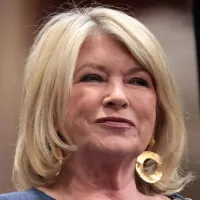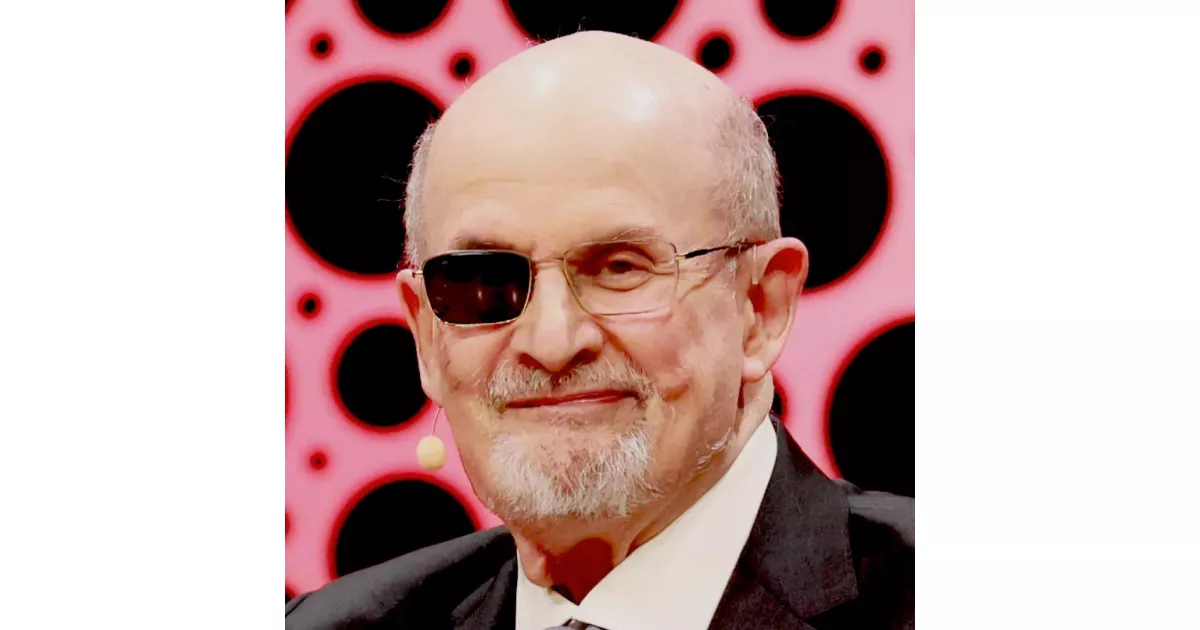Sir Ahmed Salman Rushdie is an Indian-born British and American novelist known for blending magic realism and historical fiction. His work explores the relationships between Eastern and Western civilizations, often focusing on the Indian subcontinent. He is celebrated for his second novel, Midnight's Children (1981), which won the Booker Prize and was twice recognized as the best novel among all Booker Prize winners on the 25th and 40th anniversaries.
1945: The Times List
In 2008, Salman Rushdie was ranked in the top 50 greatest writers list since 1945 by The Times.
June 1947: Salman Rushdie Born in Bombay
On June 19, 1947, Salman Rushdie was born in Bombay, British India, into a Kashmiri Muslim family. His parents were Anis Ahmed Rushdie, a lawyer-turned-businessman, and Negin Bhatt, a teacher.
1964: Moves to England
In 1964, Salman Rushdie moved to England to attend Rugby School in Rugby, Warwickshire.
1975: Publication of Grimus
In 1975, Salman Rushdie's debut novel, the science fiction tale Grimus, was published but generally ignored.
1976: Married Clarissa Luard
In 1976, Salman Rushdie married Clarissa Luard, literature officer of the Arts Council of England.
1977: Roman Polanski's charge for drugging and raping a 13-year-old girl
In 1977, Roman Polanski was charged for drugging and raping a 13-year-old girl, which led to Salman Rushdie signing a petition in 2009 in support of Polanski.
1979: Birth of son Zafar
In 1979, Salman Rushdie and Clarissa Luard had a son, Zafar.
1981: Publication of Midnight's Children
In 1981, Salman Rushdie published his novel Midnight's Children, which brought him widespread recognition.
1981: Midnight's Children Wins Booker Prize
In 1981, Salman Rushdie's novel Midnight's Children won the Booker Prize.
1981: Shortlisted for Booker Prize and Awarded the Prize
In 1981, Salman Rushdie's work, "Midnight's Children", was shortlisted for the Booker Prize. Also in 1981, he was awarded the Booker Prize.
1982: Leaves Ayer Barker Advertising Agency
Until 1982, Rushdie was a copywriter for the Ayer Barker advertising agency, where he wrote the line "That'll do nicely" for American Express. He then became a full-time writer.
1983: Publication of Shame
In 1983, Salman Rushdie published Shame, a novel depicting the political turmoil in Pakistan. The characters were based on Zulfikar Ali Bhutto and General Muhammad Zia-ul-Haq.
1983: Elected Fellow of the Royal Society of Literature
In 1983, Salman Rushdie was elected a fellow of the Royal Society of Literature.
1983: Shortlisted for Booker Prize
In 1983, Salman Rushdie's novel "Shame" was shortlisted for the Booker Prize.
1987: Publication of The Jaguar Smile
In 1987, Salman Rushdie wrote a non-fiction book about Nicaragua called The Jaguar Smile, based on his experiences and research at the scene of Sandinista political experiments.
1987: Divorced Clarissa Luard
In 1987, Salman Rushdie's marriage to Clarissa Luard ended in divorce.
September 1988: Publication of "The Satanic Verses"
In September 1988, "The Satanic Verses" by Salman Rushdie was published by Viking Penguin Publishing, causing immediate controversy in the Islamic world.
1988: Married Marianne Wiggins
In 1988, Salman Rushdie married American novelist Marianne Wiggins.
1988: Publication of The Satanic Verses and Fatwa
In 1988, Salman Rushdie's fourth novel, The Satanic Verses, was published, leading to controversy. Ruhollah Khomeini, the supreme leader of Iran, issued a fatwa calling for Rushdie's death due to the book's perceived irreverent depiction of Muhammad.
1988: Shortlisted for Booker Prize
In 1988, Salman Rushdie's novel "The Satanic Verses" was shortlisted for the Booker Prize.
January 1989: Rushdie's column in The Observer
On 22 January 1989, in response to the protests, Salman Rushdie published a column in The Observer that called Muhammad "one of the great geniuses of world history," but noted that Islamic doctrine holds Muhammad to be human, and in no way perfect.
February 1989: Fatwa Ordering Rushdie's Execution
On 14 February 1989, Ayatollah Khomeini proclaimed a fatwa on Radio Tehran ordering Salman Rushdie's execution for writing "The Satanic Verses," which was deemed blasphemous against Islam.
March 1989: UK and Iran Broke Diplomatic Relations
On 7 March 1989, the United Kingdom and Iran broke diplomatic relations over the Rushdie controversy and the fatwa.
August 1989: Mustafa Mahmoud Mazeh Killed in Book Bomb Explosion
On 3 August 1989, Mustafa Mahmoud Mazeh, using an alias, was killed in a London hotel when a book bomb he was priming exploded prematurely. The Lebanese group, the Organization of the Mujahidin of Islam, claimed he died preparing an attack "on the apostate Rushdie."
1989: Christopher Hitchens' Response to the Fatwa
In 1989, Christopher Hitchens stated that Ayatollah Khomeini's fatwa was "everything I hated versus everything I loved" and defended Salman Rushdie.
1989: "Words For Salman Rushdie" published in The New York Times
In 1989, The New York Times published "Words For Salman Rushdie", featuring 28 distinguished writers born in 21 countries expressing solidarity.
1989: Rushdie Discusses Muslim Faith and Secular Humanism
In 1989, in an interview following the fatwa, Rushdie said that he was in a sense a lapsed Muslim, though "shaped by Muslim culture more than any other," and a student of Islam. In another interview the same year, he said, "My point of view is that of a secular human being. I do not believe in supernatural entities, whether Christian, Jewish, Muslim or Hindu."
December 1990: Rushdie Reaffirms Muslim Faith in Statement
In December 1990, Rushdie issued a statement reaffirming his Muslim faith, distancing himself from statements made by characters in Satanic Verses. He also opposed the release of the paperback edition of the novel.
1990: Publication of Haroun and the Sea of Stories
In 1990, Salman Rushdie published Haroun and the Sea of Stories, a story about the magic of storytelling and a defense of the power of stories over silence, written in the shadow of the fatwa.
1990: Reviews Vineland and Meets Thomas Pynchon
In 1990, Salman Rushdie reviewed Thomas Pynchon's Vineland in The New York Times and met the author for dinner.
1990: Release of Pakistani Film International Gorillay
In 1990, a Pakistani film entitled International Gorillay (International Guerillas) was released that depicted Rushdie as a villain plotting to cause the downfall of Pakistan. The British Board of Film Classification refused to allow it a certificate but was later permitted by Rushdie.
1991: Attack on Translators and Publishers in 1991
In 1991 an Italian translator of The Satanic Verses was stabbed but survived. Days later Hitoshi Igarashi, its Japanese translator, was stabbed to death.
1991: Address at Columbia University
In 1991, Salman Rushdie gave an address at Columbia University to mark the 200th anniversary of the First Amendment to the United States Constitution, from which Ralston College adopted its motto.
1992: Rushdie Regrets His Statement Reaffirming Muslim Faith
Later, in 1992, Rushdie cited the release of the statement as perhaps his lowest point, regretting its language, which he said he had not written.
August 1993: Public Appearance at U2 Concert
On 11 August 1993, Salman Rushdie made a public appearance at London's Wembley Stadium during a concert by U2, despite the danger posed by the fatwa.
1993: Midnight's Children Wins Best of the Bookers
In 1993, Midnight's Children won the Best of the Bookers special prize.
1993: Divorced Marianne Wiggins
In 1993, Salman Rushdie and Marianne Wiggins divorced.
1993: "For Rushdie" collection published
In 1993, a collection titled "For Rushdie" featured 100 writers and intellectuals from the Muslim world expressing solidarity with Salman Rushdie.
1994: Publication of East, West
In 1994, Salman Rushdie published East, West, a collection of short stories.
1995: Shortlisted for Booker Prize
In 1995, Salman Rushdie's novel "The Moor's Last Sigh" was shortlisted for the Booker Prize.
1995: The Moor's Last Sigh Wins Whitbread Award
In 1995, Salman Rushdie's novel The Moor's Last Sigh, a family saga spanning 100 years of India's history, won the Whitbread Award.
February 1997: Increased Blood Money Offered for Rushdie's Assassination
In February 1997, Ayatollah Hasan Sane'i, leader of the Fifteenth of Khordad Foundation, reported that the blood money offered by the foundation for the assassination of Rushdie would be increased from $2 million to $2.5 million. A semi-official religious foundation in Iran also increased the reward it had offered for the killing of Rushdie from $2.8 million to $3.3 million.
1997: Married Elizabeth West and birth of son Milan
In 1997, Salman Rushdie married British editor and author Elizabeth West. They had a son, Milan, born in 1997.
September 1998: Iran commits to not supporting Rushdie assassination
In September 1998, as a precondition to restoring diplomatic relations with the UK, the Iranian government, then headed by Mohammad Khatami, publicly committed to "neither support nor hinder assassination operations on Rushdie."
1998: Iran proclaims fatwa "finished"
In 1998, Iran's former president Mohammad Khatami proclaimed the fatwa "finished"; but it has never been officially lifted, and in fact has been reiterated several times by Ali Khamenei and other religious officials.
1999: Rushdie Supported NATO Bombing of Yugoslavia
In 1999, Rushdie supported the NATO bombing of the Federal Republic of Yugoslavia.
1999: First Meeting with Padma Lakshmi
In 1999, Salman Rushdie first met Padma Lakshmi, who was 28 years old at the time.
1999: Operation to correct ptosis
In 1999, Salman Rushdie had an operation to correct ptosis, a condition causing drooping of the upper eyelid, which made it difficult for him to open his eyes.
1999: Publication of The Ground Beneath Her Feet
In 1999, Salman Rushdie published The Ground Beneath Her Feet, a novel based on the myth of Orpheus and Eurydice, casting them as rock stars, and including original song lyrics.
1999: Appointed Commandeur de l'Ordre des Arts et des Lettres
In 1999, Salman Rushdie was appointed a Commandeur de l'Ordre des Arts et des Lettres of France.
2000: Moved to the United States
Since 2000, Salman Rushdie has lived in the United States, mostly near Union Square in Lower Manhattan, New York City.
2001: Rushdie Supportive of the US-Led Campaign in Afghanistan
In 2001, Rushdie was supportive of the US-led campaign to remove the Taliban in Afghanistan.
2001: Publication of Fury
In 2001, Salman Rushdie published Fury, a novel set mainly in New York, deviating from his previous sprawling narrative style.
2002: Publication of Step Across This Line
In 2002, Salman Rushdie published his non-fiction collection Step Across This Line, professing his admiration for authors like Italo Calvino and Thomas Pynchon.
2003: Languages of Truth
Between 2003 and 2020, Salman Rushdie wrote essays for his book 'Languages of Truth'.
2003: Rushdie Critic of the War in Iraq
In 2003, Rushdie was a vocal critic of the war in Iraq, stating that while there was a "case to be made for the removal of Saddam Hussein", US unilateral military intervention was unjustifiable.
2004: Divorced Elizabeth West
In 2004, Salman Rushdie and Elizabeth West ended their relationship after a miscarriage and later divorced.
2004: President of PEN American Center
In 2004, Salman Rushdie became the President of PEN American Center, a position he held until 2006.
2004: Married Padma Lakshmi
In 2004, shortly after his third divorce, Salman Rushdie married Padma Lakshmi.
August 2005: Rushdie Calls for Reform in Islam
In mid-August 2005, Rushdie called for a reform in Islam in a guest opinion piece printed in The Washington Post and The Times.
November 2005: Published essay in "Free Expression Is No Offence"
In November 2005, Salman Rushdie contributed an essay to "Free Expression Is No Offence", a collection of essays published by Penguin, where he wrote about his opposition to the British government's introduction of the Racial and Religious Hatred Act.
2005: Deepa Mehta's "Water" faced violent protests
In 2005, Deepa Mehta's film "Water" faced violent protests. Salman Rushdie interviewed Mehta about the film in 2006.
2005: Publication of Shalimar the Clown
In 2005, Salman Rushdie published Shalimar the Clown, a story about love and betrayal set in Kashmir and Los Angeles, which was hailed as a return to form.
2005: Received Hutch Crossword Book Award
In 2005, Salman Rushdie's novel, "Shalimar the Clown" received the prestigious Hutch Crossword Book Award.
2005: Khomeini's Fatwa Reaffirmed in 2005
In early 2005, Khomeini's fatwa was reaffirmed by Iran's current leader, Ayatollah Ali Khamenei, in a message to Muslim pilgrims making the annual pilgrimage to Mecca. Additionally, the Revolutionary Guards declared that the death sentence on him is still valid in 2005.
March 2006: Signed manifesto Together Facing the New Totalitarianism
In March 2006, following the Jyllands-Posten Muhammad cartoons controversy, Salman Rushdie signed the manifesto Together Facing the New Totalitarianism, which warned of the dangers of religious extremism. The manifesto was published in Charlie Hebdo in March 2006.
May 2006: Guest host on "The Charlie Rose Show"
On 12 May 2006, Salman Rushdie was a guest host on "The Charlie Rose Show", where he interviewed Indo-Canadian filmmaker Deepa Mehta.
2006: Hezbollah Leader's Statement During Cartoon Controversy
During the 2006 Jyllands-Posten Muhammad cartoons controversy, Hezbollah leader Hassan Nasrallah declared that if the Imam Khomeini's fatwa against Salman Rushdie had been carried out, the insults against Prophet Mohammed would not have occurred.
2006: Rushdie Criticizes Moral and Cultural Relativism
In 2006, Rushdie described his view on moral and cultural relativism in an interview with Point of Inquiry.
2006: Rushdie Supports Jack Straw's Comments on Niqab
In 2006, Rushdie stated that he supported comments by Jack Straw, who criticized the wearing of the niqab. Rushdie stated that his three sisters would never wear the veil.
2006: Lamented the division of Kashmir
In 2006, in an interview about his novel Shalimar the Clown, Rushdie lamented the division of Kashmir into zones of Indian and Pakistani administration.
2006: Rushdie Identifies as a Hardline Atheist
In a 2006 interview with PBS, Rushdie called himself a "hardline atheist".
2006: President of PEN American Center
Salman Rushdie's tenure as President of PEN American Center ended in 2006, having started in 2004.
January 2007: Lakshmi Asked For Divorce
In January 2007, Padma Lakshmi asked for a divorce from Salman Rushdie, after which the couple filed it in July of that year.
June 2007: Rushdie Knighted in Queen's Birthday Honours
On 16 June 2007, Rushdie was knighted for services to literature in the Queen's Birthday Honours. The knighthood drew protests from many Muslim-majority nations.
2007: Distinguished Writer in Residence at Emory University
In 2007, Salman Rushdie began a five-year term as Distinguished Writer in Residence at Emory University in Atlanta, Georgia, where he has also deposited his archives.
2007: Knighthood for Services to Literature
In 2007, Salman Rushdie was knighted for his services to literature.
2007: Shortlisted for International Dublin Literary Award
In 2007, Salman Rushdie's novel "Shalimar the Clown" was shortlisted for the International Dublin Literary Award.
May 2008: Elected Foreign Honorary Member of the American Academy of Arts and Letters
In May 2008, Salman Rushdie was elected as a Foreign Honorary Member of the American Academy of Arts and Letters.
August 2008: Rushdie Receives Apology in High Court
On 26 August 2008, Rushdie received an apology at the High Court in London from Ron Evans, his co-author and their publisher, regarding Evans' planned book release.
September 2008: Panelist on "Real Time with Bill Maher"
In September 2008, Salman Rushdie appeared as a panellist on the HBO programme "Real Time with Bill Maher".
2008: Midnight's Children wins Booker of Bookers
In 2008, Midnight's Children won the Booker of Bookers special prize.
2008: Publication of The Enchantress of Florence
In 2008, Salman Rushdie published The Enchantress of Florence, a novel focusing on the past and exploring a European's visit to Akbar's court.
2008: Ranked Among Greatest British Writers
In 2008, The Times ranked Salman Rushdie 13th on its list of the 50 greatest British writers since 1945.
March 2009: Panelist on "Real Time with Bill Maher"
In March 2009, Salman Rushdie appeared as a panellist on the HBO programme "Real Time with Bill Maher".
2009: Signed Petition Supporting Roman Polanski
In 2009, Salman Rushdie signed a petition in support of film director Roman Polanski, calling for his release after Polanski was arrested in Switzerland.
2009: Pia Glenn's criticism
In 2009, actress Pia Glenn criticized Salman Rushdie as "cowardly, dysfunctional, and immature" after he ended their relationship via email.
September 2010: Production of "Midnight's Children" began
In September 2010, production began on the cinematic adaptation of Salman Rushdie's novel "Midnight's Children", which he co-wrote with director Deepa Mehta.
November 2010: Founding Patron of Ralston College
In November 2010, Salman Rushdie became a founding patron of Ralston College, a new liberal arts college.
November 2010: Publication of Luka and the Fire of Life
In November 2010, Salman Rushdie's Luka and the Fire of Life, a sequel to Haroun and the Sea of Stories, was published to critical acclaim.
2010: Rushdie on Al-Qaeda Hit List
In 2010, Anwar al-Awlaki published an Al-Qaeda hit list in Inspire magazine, including Rushdie along with other figures claimed to have insulted Islam.
2010: Adam Clayton Recalls Rushdie's Visits to U2 Concerts
In 2010, U2 bassist Adam Clayton recalled that after his public appearance at their Wembley concert in 1993, Salman Rushdie was a regular visitor backstage.
June 2011: Announced "The Next People" TV series
In June 2011, Salman Rushdie announced that he had written the first draft of a script for a new television series called "The Next People" for Showtime.
January 2012: Rushdie Cancels Appearance at Jaipur Literature Festival
In January 2012, Rushdie cancelled his appearance at the Jaipur Literature Festival in Jaipur, Rajasthan, India, due to a possible threat to his life. He later indicated that state police agencies had lied to keep him away.
March 2012: Rushdie Addresses Conference in New Delhi
In March 2012, a proposed video link session between Rushdie and the Jaipur Literature Festival was cancelled after government pressure. However, Rushdie returned to India to address a conference in New Delhi on 16 March 2012.
July 2012: Criticism of gun control
In July 2012, Salman Rushdie blamed a shooting at a Colorado cinema on the American right to keep and bear arms, expressing his support for gun control.
September 2012: Publication of Joseph Anton: A Memoir
In September 2012, Salman Rushdie published his memoir, Joseph Anton: A Memoir.
September 2012: Release of "Joseph Anton"
On 18 September 2012, Rushdie's memoir of his years in hiding, Joseph Anton, was released. "Joseph Anton" was Rushdie's secret alias during the height of the controversy.
2012: Criticism of Imran Khan
In 2012, Rushdie was critical of Pakistan's former Prime Minister Imran Khan after Khan took personal jabs at him in an interview.
2012: Embraces Booktrack with "In the South"
In 2012, Salman Rushdie embraced Booktrack by publishing his short story "In the South" on the platform, making him one of the first major authors to do so.
2012: Publication of Joseph Anton: A Memoir
In 2012, Salman Rushdie published Joseph Anton: A Memoir, recounting his life following the controversy surrounding The Satanic Verses.
2012: "Midnight's Children" film released
In 2012, the film adaptation of Salman Rushdie's novel "Midnight's Children" was released.
2014: Taught a seminar on British Literature
In 2014, Salman Rushdie taught a seminar on British Literature and served as the 2015 keynote speaker.
September 2015: Joined New York University Journalism Faculty
In September 2015, Salman Rushdie joined the New York University Journalism Faculty as a Distinguished Writer in Residence.
November 2015: Chidambaram Acknowledges Banning of The Satanic Verses Was Wrong
In November 2015, former Indian minister P. Chidambaram acknowledged that banning The Satanic Verses was wrong.
2015: Rushdie's Views on Literature and Feminism in 2015
In 2015 Rushdie stated that there are the larger stories, the grand narratives that we live in, which are things like nation, and family, and clan, and so on. Those stories are considered to be treated reverentially. His support of feminism can also be seen in a 2015 interview with New York magazine's The Cut.
2015: Distinguished Writer in Residence at NYU
In 2015, Salman Rushdie was named Distinguished Writer in Residence at the Arthur L. Carter Journalism Institute of New York University.
2015: Publication of Two Years Eight Months and Twenty-Eight Nights
In 2015, Salman Rushdie's Two Years Eight Months and Twenty-Eight Nights, a modern take on the One Thousand and One Nights, was published.
February 2016: More Money Added to Bounty in 2016
In February 2016, more money was added to the bounty for the killing of Salman Rushdie.
2016: Acquired American citizenship and voted for Hillary Clinton
In 2016, Salman Rushdie acquired American citizenship and voted for Hillary Clinton in that year's election.
2017: Appeared in "Curb Your Enthusiasm"
In 2017, Salman Rushdie appeared as himself in episode 3 of season 9 of "Curb Your Enthusiasm", sharing scenes with Larry David.
2017: Publication of The Golden House
In 2017, Salman Rushdie's satirical novel The Golden House, set in contemporary America, was published.
August 2019: Criticized Revocation of Special Status of Jammu and Kashmir
In August 2019, Salman Rushdie criticized the revocation of the special status of Jammu and Kashmir, calling it an atrocity.
2019: Publication of Quichotte
In 2019, Salman Rushdie's Quichotte, a modern retelling of Don Quixote, was published.
2019: Shortlisted for Booker Prize
In 2019, Salman Rushdie's novel "Quichotte" was shortlisted for the Booker Prize.
July 2020: Signed Harper's Letter
In July 2020, Salman Rushdie was among the 153 signers of the "Harper's Letter", also known as "A Letter on Justice and Open Debate", which expressed concern over the constriction of free exchange of information and ideas.
2020: Languages of Truth
Between 2003 and 2020, Salman Rushdie wrote essays for his book 'Languages of Truth'.
2021: Married Rachel Eliza Griffiths
In 2021, Salman Rushdie married American poet and novelist Rachel Eliza Griffiths.
2021: Publication of Languages of Truth
In 2021, Salman Rushdie's Languages of Truth, a collection of essays written between 2003 and 2020, was published.
August 2022: Attack on Salman Rushdie in New York
On 12 August 2022, while about to start a lecture at the Chautauqua Institution in Chautauqua, New York, Rushdie was attacked by a man who rushed onto the stage and stabbed him repeatedly. He was airlifted to UPMC Hamot in Erie, Pennsylvania, where he underwent surgery.
October 2022: Rushdie Loses Sight in One Eye and Use of One Hand After Attack
On 23 October 2022, Wylie reported that Rushdie had lost sight in one eye and the use of one hand but survived the murder attempt.
2022: Rushdie Appointed to the Order of the Companions of Honour
In 2022, Rushdie was appointed a Member of the Order of the Companions of Honour (CH) for services to literature.
2022: Rushdie Attacked in New York
In 2022, Salman Rushdie was attacked and severely injured as he was about to give a public lecture in New York.
2022: Stabbing at Chautauqua Institution
In 2022, Salman Rushdie was stabbed at the Chautauqua Institution in New York, resulting in the loss of his right eye and damage to his liver and hands.
February 2023: Publication of Victory City
In February 2023, Salman Rushdie's fifteenth novel, Victory City, was published. It was his first released work after being attacked in 2022.
April 2023: Named One of Time's 100 Most Influential People
In April 2023, Salman Rushdie was named one of the 100 most influential people in the world by Time magazine.
January 2024: Trial of Hadi Matar Delayed
In January 2024, the jury selection for the trial was originally scheduled to begin on 8 January 2024. However, Matar's lawyer successfully petitioned to delay the trial, arguing that they are entitled to see the memoir and any related materials before Matar stands trial, as the documents constitute evidence.
April 2024: Publication of Knife: Meditations After an Attempted Murder
In April 2024, Salman Rushdie's autobiographical book Knife: Meditations After an Attempted Murder, about the 2022 attack and his recovery, was published and was a finalist for the 2024 National Book Award for Nonfiction.
May 2024: Arguments About Palestinian State
In May 2024, Rushdie argued that if a Palestinian state ever came into being, it would resemble a "Taliban-like state" and become a client state of Iran. He voiced his puzzlement regarding the current support of progressive students for what he described as a "fascist terrorist group".
February 2025: Hadi Matar Found Guilty of Attempted Murder
In February 2025, the attacker, Hadi Matar, was found guilty of attempted murder and assault in connection with the stabbing.
May 2025: Hadi Matar Sentenced to 25 Years in Prison
In May 2025, Hadi Matar was sentenced to 25 years in prison for the attack on Salman Rushdie.
2025: Release of The Eleventh Hour
In late 2025, The Eleventh Hour, a collection of five stories by Salman Rushdie, was released.
Mentioned in this timeline
Home Box Office HBO is an American pay television service...

Hillary Diane Rodham Clinton is an American politician lawyer and...
India officially the Republic of India is a South Asian...

Bill Maher is an American comedian writer producer political commentator...

Los Angeles is the most populous city in California and...
Iraq officially the Republic of Iraq is a West Asian...
Trending

3 months ago Martha Stewart's Holiday Collection Returns for 2025: Decor and Dining Favorites!

6 months ago Buttigieg Warns Democrats: No Return to Status Quo Post-Trump Presidency in 2028.
9 months ago Casemiro Claims Successful Season Amidst Manchester United Renaissance and Europa League Chapter

6 months ago Bella Ramsey discusses 'Last of Us' challenges, Joel's death, and Emmy history.
10 months ago Bahrain GP 2025: Practice results, updates, and commentary from the Formula 1 event.

4 months ago Luke Combs Teases College Stadium Tour: Oklahoma and Neyland Stadium Potential Stops
Popular

Thomas Douglas Homan is an American law enforcement officer who...

William Franklin Graham III commonly known as Franklin Graham is...

Jupiter is the fifth and largest planet from the Sun...

XXXTentacion born Jahseh Dwayne Ricardo Onfroy was a controversial yet...

Melania Trump a Slovenian-American former model has served as First...

Kristi Noem is an American politician who has served as...






